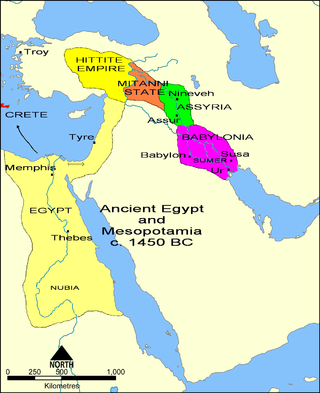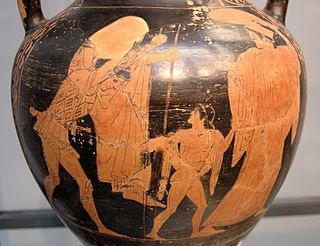The 1190s BC is a decade which lasted from 1199 BC to 1190 BC.
Contents
| Millennium |
|---|
| 2nd millennium BC |
| Centuries |
| Decades |
| Years |
|
| Categories |
The 1190s BC is a decade which lasted from 1199 BC to 1190 BC.
| Millennium |
|---|
| 2nd millennium BC |
| Centuries |
| Decades |
| Years |
|
| Categories |
The 11th century BC comprises all years from 1100 BC to 1001 BC. Although many human societies were literate in this period, some of the individuals mentioned below may be apocryphal rather than historically accurate.
The 8th century BC started the first day of 800 BC and ended the last day of 701 BC. The 8th century BC was a period of great change for several historically significant civilizations. In Egypt, the 23rd and 24th dynasties lead to rule from Kingdom of Kush in the 25th Dynasty. The Neo-Assyrian Empire reaches the peak of its power, conquering the Kingdom of Israel as well as nearby countries.
The 9th century BC started the first day of 900 BC and ended the last day of 801 BC. It was a period of great change for several civilizations. In Africa, Carthage is founded by the Phoenicians. In Egypt, a severe flood covers the floor of Luxor temple, and years later, a civil war starts.
The 10th century BC comprises the years from 1000 BC to 901 BC. This period followed the Late Bronze Age collapse in the Near East, and the century saw the Early Iron Age take hold there. The Greek Dark Ages which had come about in 1200 BC continued. The Neo-Assyrian Empire is established towards the end of the 10th century BC. In the Iron Age in India, the Vedic period is ongoing. In China, the Zhou dynasty is in power. Bronze Age Europe continued with Urnfield culture. Japan was inhabited by an evolving hunter-gatherer society during the Jōmon period.
The 12th century BC is the period from 1200 to 1101 BC. The Late Bronze Age collapse in the ancient Near East and eastern Mediterranean is often considered to begin in this century.

The 15th century BC was the century that lasted from 1500 BC to 1401 BC.
The 1130s BC is a decade which lasted from 1139 BC to 1130 BC.
The 1150s BC is a decade which lasted from 1159 BC to 1150 BC.
The 1080s BC was a decade which lasted from 1089 BC to 1080 BC.
The 1060s BC is a decade which lasted from 1069 BC to 1060 BC.
The 1180s BC is a decade which lasted from 1189 BC to 1180 BC.

The 1250s BC is a decade which lasted from 1259 BC to 1250 BC.
The 1500s BC was a decade lasting from January 1, 1509, BC to December 31, 1500, BC.

The 1300s BC is a decade which lasted from 1309 BC to 1300 BC.
The 950s BC is a decade which lasted from 959 BC to 950 BC.
The 1390s BC is a decade which lasted from 1399 BC to 1390 BC.

Ascanius was a legendary king of Alba Longa and is the son of the Trojan hero Aeneas and Creusa, daughter of Priam. He is a character in Roman mythology, and has a divine lineage, being the son of Aeneas, who is the son of the goddess Venus and the hero Anchises, a relative of the king Priam; thus Ascanius has divine ascendents by both parents, being descendants of god Jupiter and Dardanus. He is also an ancestor of Romulus, Remus and the Gens Julia. Together with his father, he is a major character in Virgil's Aeneid, and he is depicted as one of the founders of the Roman race.

In Greek mythology, Demophon was a veteran of the Trojan War and king of Athens. The son of Theseus and Phaedra, Demophon was raised in exile by a family friend after his father was deposed. He later fought in the Trojan War, being one of those who hid in the Trojan Horse. Following the fall of Troy and the rescue of his grandmother Aethra, Demophon is said to have landed in Thrace on his return journey, where he met and married Phyllis, the daughter of the king. Leaving for Athens, Demophon promised to return, and when he did not, Phyllis committed suicide in despair. Arriving in Athens after a possible stop in Cyprus, Demophon succeeded Menestheus as king of Athens, supposedly in 1183 B.C. As king, he gave refuge and land to the Heracleidae in Athens, fought Diomedes and wrested the Palladium from him, presided over the creation of the court of the Ephetae, and hosted Orestes during his madness. Demophon died in Athens in 1150 B.C. after a reign of 33 years, and was succeeded by his son Oxyntes.
The Chahamanas of Naddula, also known as the Chauhans of Nadol, were an Indian dynasty. They ruled the Marwar area around their capital Naddula between 10th and 12th centuries. They belonged to the Chahamana (Chauhan) clan of the Rajputs.

The end of the 19th Dynasty of Ancient Egypt is a period of short-reigning rulers c. 1203-1187 BC. After the death of Merneptah, there was a conflict for the throne between Seti II and Amenmesse, which eventually resulted in the victory of Seti II. Seti II's reign was short, as he died within a year of regaining power. His wife, Twosret, took control with the support of Bay and the puppet Pharaoh Siptah. However, Twosret later eliminated Bay, and Siptah died under mysterious circumstances. This soon triggered a new power struggle between Twosret and Setnakhte. This struggle culminated in the triumph of Setnakhte, who is now remembered as the founder of the 20th Dynasty.